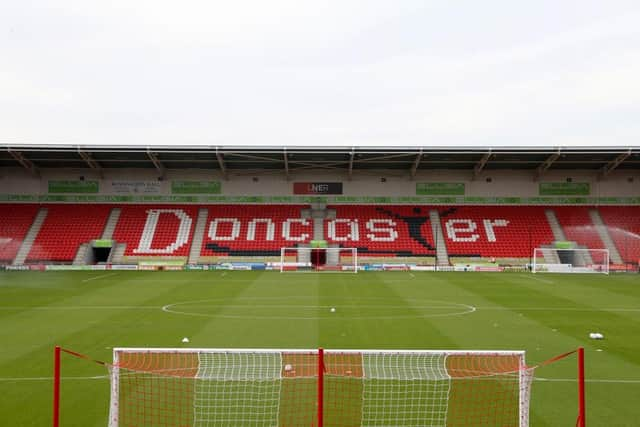Football finance expert delivers assessment on latest Doncaster Rovers accounts
and live on Freeview channel 276
Doncaster lost £1.07 million in the 12 months to July 2022, which also saw them relegated from League One, the newly released figures show.
It came after the club made an operating profit of £98k in the first full year of the Covid-19 pandemic, taking Rovers’ total losses since 1999 to more than £33.5 million.
Advertisement
Hide AdAdvertisement
Hide Ad"Clubs are still coming out of that pandemic period,” explained football finance expert Dr Dan Plumley, a senior lecturer in sport finance at Sheffield Hallam University.


"Clubs lower down the pyramid were hit hardest and weren’t self-sustainable before Covid. Doncaster, in that regard, are tracking to the norm.
"If you do see a statement from the club, they will probably say £1 million isn’t a bad loss to make.
"It’s not great, but it’s absolutely representative of that club in that league at this point in time.
Advertisement
Hide AdAdvertisement
Hide Ad"People will look at £33 million and that’s eye-watering. That’s absolutely true, but that’s the nature of the industry and how it’s evolved over time.”


Doncaster are yet to comment on their latest accounts, which appeared on the Companies House website on Friday. The Free Press has approached the club for a comment.
Explaining them in a wider context, Dr Plumley said: “Football clubs can sustain losses, but it's usually the owners that are sustaining those losses.
"It only becomes a problem if they can’t, or will not, sustain them any longer.
Advertisement
Hide AdAdvertisement
Hide Ad"Football clubs make losses for the most part. They shouldn’t, we know that, but this is the nature of the business at the minute.”
Earlier this year Gavin Baldwin revealed Doncaster Rovers “would make significant losses” without the income of Club Doncaster.
Baldwin, who heads up Club Doncaster, has been tasked with making Rovers self-sustainable from a financial perspective.
He previously claimed the club would be better off financially in League One.
Advertisement
Hide AdAdvertisement
Hide AdDr Plumley said: "That’s a fair assessment and he will know the numbers from the inside. At club level, you know how you compare to others in the league.”
Dr Plumley admitted self-sustainability “comes at a cost” – in Doncaster’s case it led to their lowest league finish in 20 years – and added: “It’s a fine line between sustainability at that level (League Two) and getting out of the league.
"You have got to look at the make-up of the league and where you position yourself.
"I wouldn’t be hitting the panic button yet, but at the same time you want to get out of that league.”
Advertisement
Hide AdAdvertisement
Hide AdDr Plumley said factors such as higher attendances and the new TV deal for EFL clubs from the 24/25 season – worth 50 per cent more than the current agreement – will help boost income for clubs like Rovers.
He said: “I’m yet to see a breakdown of how the split is going to work between the leagues.
"You would expect League Two clubs to get the worst of that deal, but it will be worth more than before.”
Getting out of League Two
Clubs in League One and Two are not affected by Financial Fair Play rules.
Advertisement
Hide AdAdvertisement
Hide AdInstead, they sign up to a Salary Cost Management Protocol which limits spending on player wages to a percentage of their turnover.
This is 55 per cent for League Two sides and 60 per cent for those in League One.
But it is not formally policed, meaning any breach of the rules are not punished by fines or points deductions, as they would be higher up the pyramid.
This essentially provides well-backed sides like Wrexham, Notts County and Stockport with a green light to spend what they like, as long as their owners are willing to foot the cost.
Advertisement
Hide AdAdvertisement
Hide AdThere are fears Doncaster could be priced out of a promotion push next season because of their rivals’ greater resources.
That’s despite what the club’s owner, Terry Bramall, described as a “significant financial injection” into the playing budget, which has allowed new boss Grant McCann to sign eight new players.
Dr Plumley believes Rovers will still have a chance against the division’s money men.
He said: “I think they will be targeting play-offs at least.
Advertisement
Hide AdAdvertisement
Hide Ad"I think they are probably where the chief executive had it in terms of where they were last season, they would position themselves in the top six to 10 (budgets) in the league.
“I still think they would be looking at at least being in the top half.
"Given the infrastructure, the club’s stadium size, their average position where they have been (in recent years), they would be looking at between six and tenth as a ballpark.”
Bramall took advice from “EFL experts” before deciding how much money to invest in the team for next season, according to Baldwin.
Advertisement
Hide AdAdvertisement
Hide AdHis investment is worth seven figures, former Doncaster chairman John Ryan has claimed.
Dr Plumley added: “Wrexham will spend and have spent. Stockport nearly went up back-to-back, they will be strong again.
"It does look like a tougher league than last season.”
There’s also Notts County to consider, while Gillingham, Bradford City and Salford have all flexed their financial muscles in recent times.
They are all expected to compete at the top end of the table next term, with Mansfield and MK Dons also tipped for success by bookmaker SkyBet.
McCann’s men begin the new season at home to Harrogate on Saturday, 5 August.
